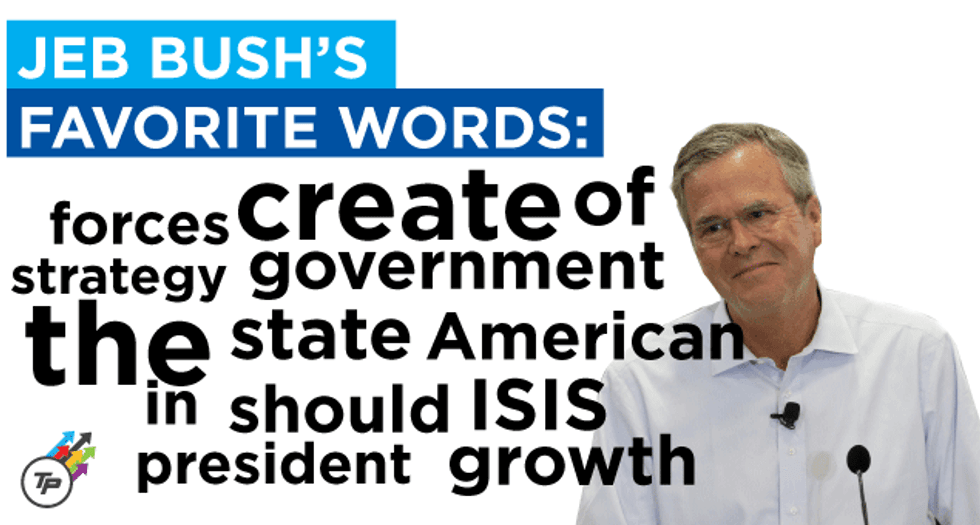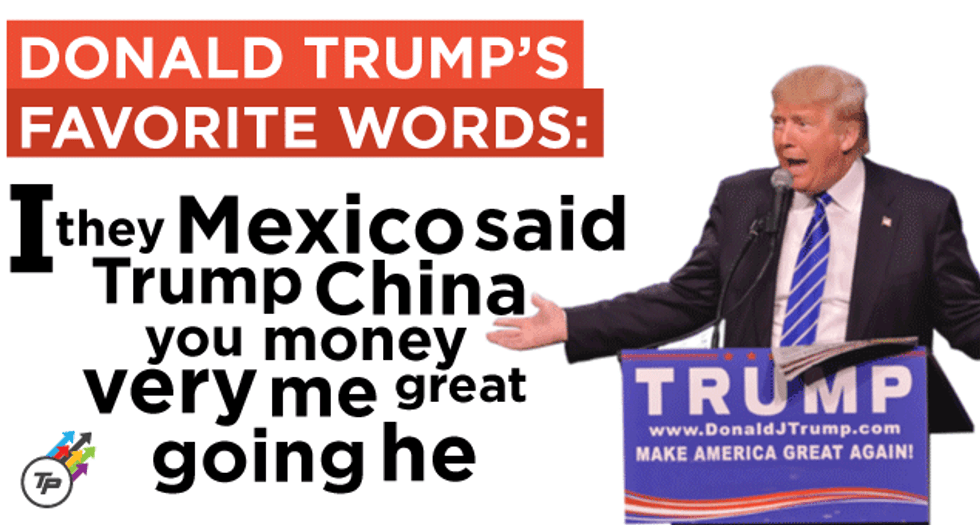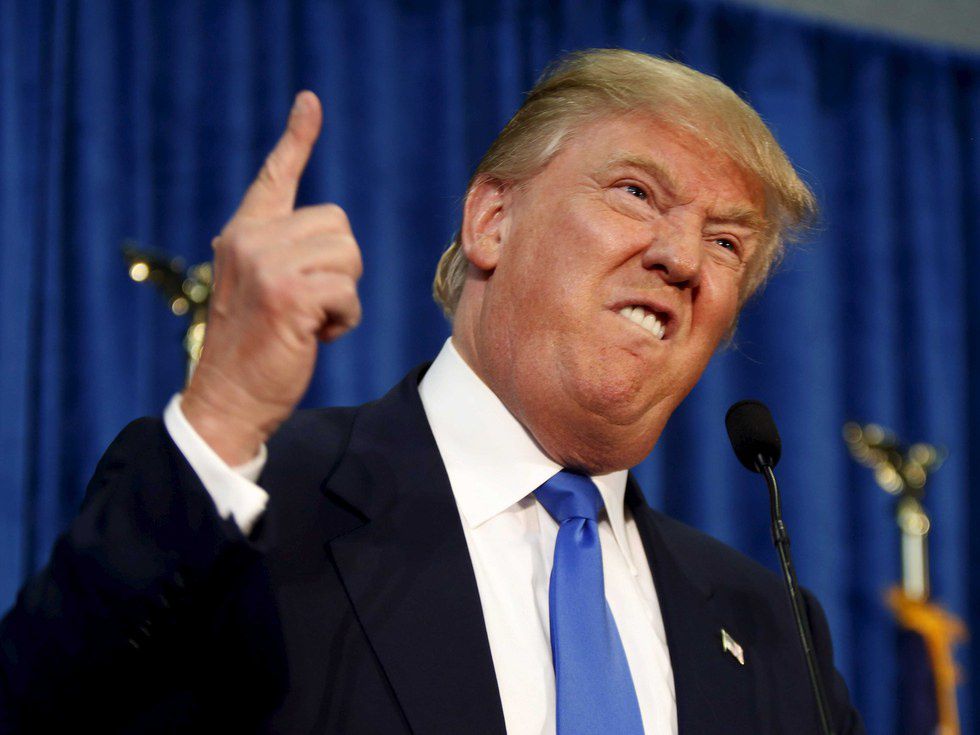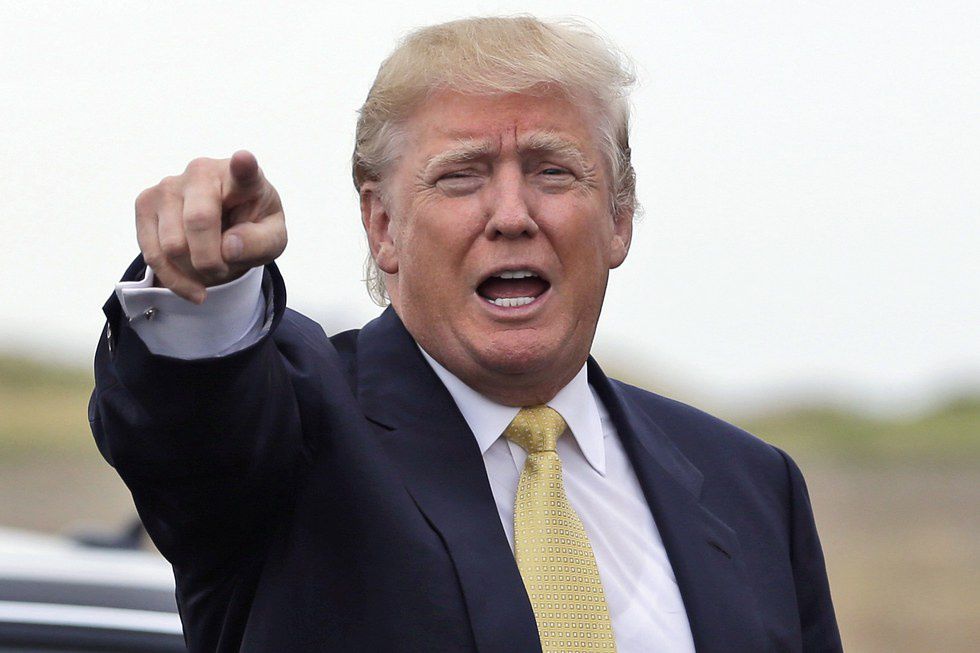If you are anything like me, you have a morbid fascination with the mystery that is Donald Trump. Now, don't get me wrong: I don't like the guy. At all. But, after having been surrounded by those particular individuals who actually do support him - and quite fervently - I find myself constantly wondering why on earth he is so popular.
I find myself trying to analyze him (without getting too much of a Trump-induced headache) and figure out what his appeal is to people of all generations. When I ask the people around me - or, as happened recently, I am stuck in a small, enclosed space filled with my five most racist and opinionated uncles for Thanksgiving and am forced to sit and listen as I have no way to flee the area on my own - I tend to hear four different answers about why they like him, all centering around one theme.
1. He is a man who cannot be pushed around and we need someone with a strong back to lead this country.
2. He is not like the other politicians who always go back on their promises. Trump is the real deal.
3. He is a respected and knowledgeable businessman who can get us out of our colossal debt crisis.
4. I hate Hillary Clinton.
Now, some of these arguments are valid. I mean, he is bull-headed enough to get stuff done, granted, though the nature of his goals seems to be a bit sketchy in my eyes - and also a fair bit racist.
But some of these arguments proposed by my family and others are more perplexing, particularly the arguments regarding his being unlike any other presidential candidate. This one is hard to disagree with. Obviously, for better or for worse, he is different. He is blunt, totally and unashamedly not politically correct, and he is quite possibly one of the most ineloquent men I have ever had the misfortune of hearing speak.
So, for the sake of my sanity and yours, I am only going to address this last point: the linguistic anomaly that is Donald Trump.
So, let's get started, shall we?
Researchers have done studies on the speech patterns of presidential candidates and have discovered that, unlike nearly every other presidential candidate in American history, Donald trump is profoundly ineloquent and, at times, quite crude. However, there may be a method behind his near-literal madness.
1. Simple sentences, simple words
Unlike most of his presidential candidate competitors, the average syllable count and complexity of Trump's words is, on average, much lower.
Think Progress, an American progressive news blog, paired up with Mark Liberman, a Univesity of Pennsylvania linguistics professor, to try and analyze Trump's speech patterns against other political contenders such as Jeb Bush.
What Liberman found was that Jeb Bush speaks in the very typical style of a politician. He is eloquent, clear, and uses relatively large words in his speeches. Donald Trump, on the other hand, used words that are, across the board, much smaller and simpler than Bush's.
Bush tends to use words that reflect a more typical political culture and tend to be words used for describing political policies. Liberman selected the 13 most used words by Bush and found that over half of them were two syllables or more. Bush's most frequently-used word being "the" and second is the word "create."
Donald Trump, on the other hand, uses words that are much simpler and smaller. The same study states that, of Trump's most popular 13 words, eight of them were one syllable long and almost none of them were formally political. Trump's most frequently used word just so happened to be "I" and his only three syllable word was "Mexico."
So, why is this such a big deal? Let's take a look at some more studies first.
2. Trump speaks like a third grader
In order to determine what reading level books are to be rated as, it is put through a system like the Flesch-Kincaide readability test, which takes a transcript of some variety and analyzes the word usage, syllable count, word count, and words per sentence, among other things in order to determine what grade level that particular text is suitable for.
When this test was subjected to some of Trump's speeches and debates, it was found that he scored, on average, around a third to fourth-grade level, whereas some of his counterparts such as Ted Cruz, who scored at a ninth-grade reading level. For comparison, this article was scored at around an eleventh-grade reading level.
Now, for some who may be listening to the presidential debates and rallies, this lower level of speaking can be appealing. And, studies show that it is this type of speaking method that seems to be giving Trump an edge over his competitors in a world that is tired of the hollow promises of political speeches. So, although Trump is quite hard to listen to, he is, quite simply, different than the other candidates, both in the past and in this current running. And, for those who have been around long enough to be tired of the usual political run-around, this is a good enough sign for them.
3. Insults and childish argumentation tactics
It is no secret that Donald Trump likes to insult people. In fact, people have made entire videos about just some of the people Trump has offended and verbally insulted and they come nowhere close to cataloging all of his insults. However, the majority of his insults are not that eloquent either, most of which being of the variety of "dummy," "weak," "low-energy," "loser," "moron" and "lightweight" among many, many others.
With all of these names being thrown around, it can seem more like Trump is the instigator in an elementary school fight behind the dugout and less like he is interacting with real, functioning, intelligent adults.
And, as much of a low-shot as that may sound, it is actually not that far from the truth.
Meihsing Kuo published a study in 2011 on the argumentation styles and roles of young children and discovered some interesting thing about how children argue and negotiate. She found that, in children ages three to four, some of the main argument tactics used include insistence and repetition ("expressing rejections without any support, including direct counter-assertion; reiterating, including direct counterargument"), justification and verbal abuse("threatening, taunting, mocking, name-calling") as well as some non-verbal tactics such as ignoring an opponent or argument and becoming physically violent.
A simple scan of any of Trump's debates, speeches, and rallies reveals some alarmingly similar tactics when he is delivering his arguments. He will often deliver his arguments and counter arguments in a way so as to provide as few details and real information in as possible, as well as, as mentioned earlier, calling his opposition names and mocking them.
In addition to this, Trump's nonverbal speaking methods, with his wide, open-handed gestures and "flapping" arms, has the effect of making him appear larger and more imposing and, arguably, more violent-looking. All of these components, when combined with his lack of speaking eloquence and complexity, aid in him looking like a small child when arguing with his opponents.
4. Speaking in the second person
Another subtle and an easily missed nuance of Trump's speech is the fact that he often speaks in the second person.
Now, to those of you who need a refresher on English grammar and sentence structure, there are three basic ways of speaking: first, second and third person. The first person, which Trump also uses frequently, deals with the "I" voice, whereas the second person uses the "you" voice to directly address - and manipulate - the audience.
Trump utilizes this form of speech to communicate directly with the audience and, in a sense, put words right into their mouths. He speaks as though we, as the audience and his assumed supporters, already agree with him. This direct form of discourse also makes it appear that he is more directly interacting with us and thus also appears to be more human and more honest. To his credit, the higher speaking forms of most other political candidates can sometimes seem more like they are talking over us rather than to us.
So, although Donald Trump's methods of speaking may be the political equivalent of reading one hundred freshman research papers back to back, he may have something going for him when it comes to his ability to relate to people.
The simple fact of the matter is that, although his intentions may be questionable and his methods downright irritating, he is winning right now. He, as compared with his opponents, comes off as relatable, driven, strong-willed, very commanding, and, most importantly, human, which many people want right now.
So, I suppose I can see where my uncles are coming from when they say that they like Trump and that they think he would make a difference in the world of politics.
However, a word of caution to the undecided: do not be fooled by psychological tactics and cheap humor. Listen to what is being said by the politicians, understand what they are really saying and what they are really implying in their speeches, and truly determine for yourself if the meaning of their words is something you are willing to stand behind.
Because a funny and relatable president is not necessarily a good one.











 Energetic dance performance under the spotlight.
Energetic dance performance under the spotlight. Taylor Swift in a purple coat, captivating the crowd on stage.
Taylor Swift in a purple coat, captivating the crowd on stage. Taylor Swift shines on stage in a sparkling outfit and boots.
Taylor Swift shines on stage in a sparkling outfit and boots. Taylor Swift and Phoebe Bridgers sharing a joyful duet on stage.
Taylor Swift and Phoebe Bridgers sharing a joyful duet on stage.













